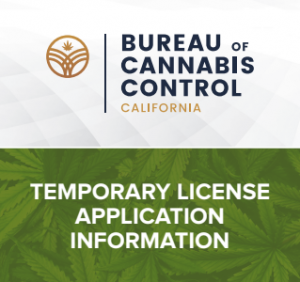California to Issue Temporary Cannabis Licenses Starting January 1

The Bureau of Cannabis Control (formerly the Bureau of Medical Cannabis Regulation)(hereafter the “Bureau”) released information today regarding temporary cannabis licenses, which will be available beginning on January 1, 2018. The Bureau is the primary licensing agency for cannabis distributors, testing laboratories, retail stores, and microbusinesses within California.
Temporary state licenses will only be issued to applicants that have a local permit, license, or other authorization. What exactly this authorization looks like will depend on the local jurisdiction. No temporary license will be effective prior to January 1, 2018. Once issued, temporary licenses will be valid for 120 days (4 months), though they can be extended for 90 days and possibly longer if the Bureau takes longer than expected to issue permanent licenses. During this period, a company with a temporary license can and should be working to submit its full state license application. Companies that have received a temporary license will only be able to do business with other companies that have received temporary or permanent licenses.
Applicants will be required to provide the following information for a temporary license from the Bureau:
- Local jurisdiction authorization – Applicants must provide a copy of a valid license, permit, or other authorization issued by the local jurisdiction where the business is operating that allows the applicant to conduct commercial cannabis activity at the location. The authorization must specify that the applicant is authorized to conduct cannabis activity.
- Name – Applicants must provide a name of the individual or entity requesting the license.
- License type requested – Distributor, Retailer, Microbusiness, or Testing Laboratory.
- License designation requested – A-license (adult use) or M-license (medicinal).
- Contact information – Applicants must provide a designated primary contact including first and last name, title, address, phone number(s), and email address(es).
- Owners – For each owner that meets the criteria of Business and Professions Code section 26001 (al), the owner’s name, mailing address, and email address.
- Physical address – Location of the proposed premises.
- Authorization to use the location – A copy of the title or deed to the land where the premises is proposed to be located. If the applicant does not own the land, a document from the landowner stating that the applicant has the right to occupy the property and may use the property for the commercial cannabis activity.
- Premises diagram – A diagram of the business’s layout at the proposed location.
Lori Ajax, Chief of the Bureau, says that temporary licensees will receive approval via e-mail and will be able to print their temporary license from home. The final regulations for medical and adult use cannabis businesses will be released in November, and full-length license applications will be available soon after that.
The Bureau and the other two California cannabis licensing agencies, the Department of Food & Agriculture’s CalCannabis Licensing Division and the Department of Public Health’s Manufactured Cannabis Safety Branch (formerly OMCS) plans to hold licensing workshops around the state starting in October. Be sure to check the Bureau’s website at www.bcc.ca.gov for more information and updates related to cannabis licensing.
